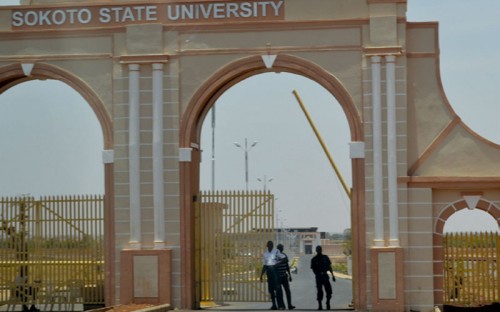The Sokoto State University community was thrown into a state of alarm on Tuesday afternoon as a newly constructed female hostel was consumed by a raging fire. The inferno, which erupted around 3:30 p.m., completely destroyed the building, leaving behind a stark reminder of the potential for unforeseen disasters. The hostel, recently completed and intended to alleviate the chronic accommodation shortages faced by students, was tragically reduced to ashes before it could fulfill its purpose. The incident sparked widespread concern and speculation among students and staff, highlighting the importance of fire safety measures and preparedness within university environments.
The precise cause of the fire remains shrouded in uncertainty, leaving room for conjecture and speculation. While investigations are undoubtedly underway, no definitive explanations have been offered by university authorities or fire officials. One student eyewitness, speaking under the veil of anonymity, confirmed the perplexing nature of the incident, stating, “We don’t know what started the fire yet.” The lack of clarity surrounding the origin of the fire only adds to the anxiety and unease within the university community. Determining the cause will be crucial not only for understanding this specific event but also for preventing similar incidents in the future. A thorough investigation will be necessary to explore all potential contributing factors, including electrical malfunctions, accidental ignition sources, or even deliberate acts of arson.
Fortuitously, despite the complete destruction of the building, no students were injured or harmed in the fire. This fortunate outcome can be attributed to a timely directive from the university administration, which had previously relocated the students assigned to the new hostel to older accommodation facilities. While the rationale for this relocation remains undisclosed, the decision undoubtedly averted a potential tragedy. The student eyewitness further emphasized this point, noting, “The students who were initially assigned to this hostel had been moved to the old hostel. Only the school authorities can explain why.” The preemptive relocation underscores the importance of proactive measures in managing potential risks and safeguarding student welfare.
The Students’ Union President confirmed the incident and the subsequent response from fire services. Firefighters arrived at the scene approximately an hour and a half after the fire broke out, around 5:00 p.m., and engaged in efforts to control and extinguish the flames. While their intervention likely mitigated further spread of the fire to surrounding structures, the hostel itself was already beyond salvage. The delayed arrival of firefighters raises questions regarding the responsiveness of emergency services and the accessibility of fire hydrants and other essential infrastructure within the university campus. A comprehensive review of emergency response protocols will be crucial to improve future preparedness and minimize potential damage.
The incident highlights the vulnerability of student accommodation facilities and underscores the urgent need for robust fire safety measures. University authorities should prioritize the implementation of comprehensive fire prevention and suppression systems in all student residences. This includes regular inspections of electrical systems, the installation of smoke detectors and fire alarms, and readily available fire extinguishers. Furthermore, regular fire drills and safety awareness campaigns should be conducted to educate students on proper evacuation procedures and emergency response protocols. Investing in preventative measures and promoting a culture of safety are paramount to minimizing the risk of future fire incidents.
The absence of an official statement from the university administration regarding the incident is notable. While investigations are likely ongoing, the lack of immediate communication can contribute to speculation and misinformation. It is imperative for the university to provide timely and transparent updates to the student body, staff, and the wider community. A comprehensive assessment of the incident, including the cause, extent of damages, and plans for future preventative measures, should be publicly shared. Open communication and accountability will be crucial in rebuilding trust and ensuring the safety and well-being of all stakeholders. The incident serves as a stark reminder of the importance of proactive safety measures, effective emergency response protocols, and transparent communication within university environments.


